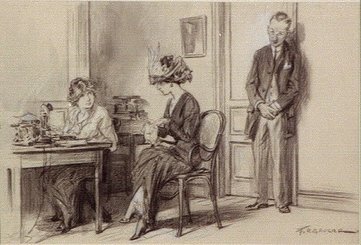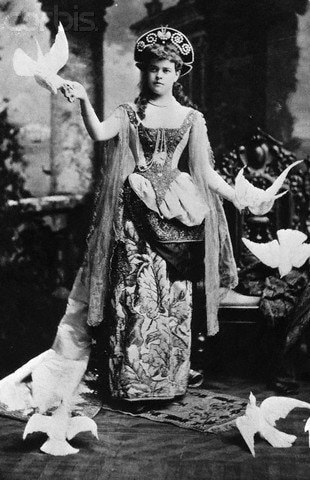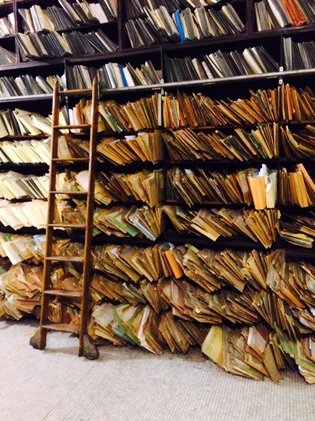
 Alvah Vanderbilt at costume ball 1883. Source: Wikimedia
Alvah Vanderbilt at costume ball 1883. Source: Wikimedia Sealing divorce files from public viewing can come in extremely handy for celebrities trying to keep their personal lives private. When Alva Vanderbilt sought a divorce from her husband William in 1895 for adultery her lawyer wrote about keeping the records sealed.
“How indignant they are (the press),” he wrote, “not to be able to get any of the particulars. Imagine what a to-do they would have made if they had got hold of those, if they can cover a whole broadside with nothing. I think the case has been well managed in that at least there has been no filth in sight, the whole thing has been kept profoundly secret.”
 Stacks at the Old Records Division NYC Courthouse. Source: Sheila Myers
Stacks at the Old Records Division NYC Courthouse. Source: Sheila Myers Divorce amongst celebrities has always been fodder for the press, so it didn’t surprise me that William West Durant wanted his sealed in 1898. He was the son of a famous robber baron, Dr. Thomas C. Durant, who forged the Transcontinental Line across the American west, and was he famous in his own right for the grand camps he built in the Adirondack Mountains.
Below are some excerpts from an article about the Durant divorce from the New York World (1898) which read like a soap opera:
“People talked of the Durants as the ideal family. They had everything, they worshipped each other. Their marriage was a dream of happiness …the three little children wept when they learned that their papa and their beautiful mama no longer loved each other.”
The courtroom drama was the source of this poetic account of the downfall of the Durant marriage. Neither of them won the case and they were forced to stay married until several months later when Duran’s wife Janet filed another suit in 1898. This one was sealed. His divorce was shrouded in secrecy and I sought to find out why.
Prior to my visit to the Old Record Division in Manhattan where his divorce record was housed, I had been on a long sojourn looking for primary material on William West Durant. I had combed through his collection of letters at the Library of Congress. There, you have to have an official i.d. just to get in the door of the manuscript collections. The staff wear police-style uniforms and make you sign in; they ask you to put all of your belongings in a locker; you can’t use sticky notes to tag files you may want to copy (as I unfortunately found out after doing so); you can only use the pencils and paper they provide; and they check your laptop before you leave to make sure you have not sequestered any historical documents. Oh and DON”T EVEN THINK ABOUT EATING OR DRINKING ANYTHING in there.
So you can just imagine my surprise when William’s divorce file was plunked down in front of me unceremoniously and the clerk said, “Someone really wanted this sealed from the public.” I tried to hide my shock that he even found the record hidden in the stacks of manila files that covered floor to ceiling in the basement of this 19th century building in downtown Manhattan.
I looked at the old paper, the color of tea, broke the thrice-waxed seal and carefully unfolded the court document. The papers were so brittle I could hear them crinkle in my hands and I desperately hoped they wouldn’t tear. That was futile, as one wrong move and I had torn a small corner of one of pages. I looked around. No one was paying any attention to me. I sighed with relief, then gasped when I read the first few lines.
There were only a couple of reasons divorces were granted back in 1898, a spouse had to prove cruelty or adultery, and it was the Irish maid that did William in (but not in the way one would think). But more important than what I found in the file and what will eventually make it into my novel, is the pressing issue: does the public have a right to know about intimate details of people’s private lives when they use the courts to settle civil disputes?
It took 100 years and my unending curiosity to bring this file out from under layers of the divorce files that came after it. Would it have made a difference if the real reasons for the divorce had been exposed earlier? I think it would.
In 1898 William was in the midst of fighting a very public court battle brought against him by his sister Ella. She was trying to reclaim her inheritance and was making accusations against William that as the manager of the family estate he had squandered her inheritance as well as misled her about how much she was entitled to. Williams’ defense was she was a wayward, unconventional woman without moral character, dragging into play old letters from their mother and father, rebuking Ella for her disobedience. One newspaper — The Sun — ran a headline of the court proceedings calling Ella ‘Naughty’. She was forty years old at the time of the trial.
Indeed, when Ella’s lawyer questioned William’s intent, wounding his sister’s reputation as a defense, William said:
“I only said in previous testimony that my father found fault with her because she stayed up late with visitors. I said visitors and didn’t name anyone to shield her.”
Lawyer:
“You call your conduct at this trial shielding your sister? Why then would you have your lawyer ask her these questions to make the court disbelieve her?”
William:
“Because my sister is attacking my reputation and my honor and if her assertions are true I am a scoundrel of the first water.”
I am not, 100 years later, going to pass judgement on the man and his actions in the case of his divorce. I do however, as an author of historical fiction on the Durant family have to figure out what to do with the Pandora’s box of court documents I have access to, including the divorce file. It says a lot about the character of someone who seeks to seal documents that are damaging to themselves while simultaneously presenting documents that prove damaging to someone else.
 RSS Feed
RSS Feed
